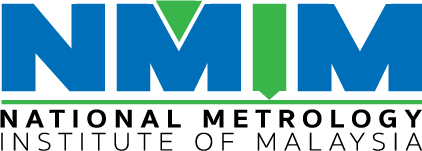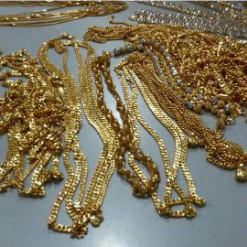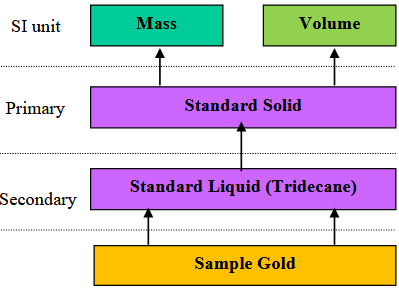NMIM Publications
Purity Gold

Expired
/ Title
High Accuracy of Gold Density Measurement by Using Hydrostatic Weighing Method
Fazrul Mohd Nor
/ Introduction
Density of a material is determined by mass per unit volume of the material. It can be stated in grams per millilitre (g/ml) or in the SI unit system in kilograms per cubic meter (kg/m3). The purpose of measuring density of a material is to maintain its quality control, concentration, determination and also purity of precious metals. Gold is one of precious metals. It is important to determine its purity because the value of gold depends on it. Figure 1 shows types of gold available in the market that is of 24 carat, 22 carat, 18 carat, 14 carat, 12 carat and 10 carat. The purity of gold will be less of value if there is reduction in the density of gold. The gold density is 19.3 g/ml at purity of 24 carat.
The hydrostatic weighing method applied to determine the density of gold. Figure 2 shows a densimeter used in this method to measure the gold density and determine the gold purity. This instrument is commonly used in pawn shops, bank agencies and jewellery shops to check the gold purity. This method is economical, however, its accuracy to measure the gold density is rather inaccurate due to the uncertainty of densimeter is 0.1 g/ml. Distilled water is used as a standard liquid in densimeter. The gold is weighed in air and immersed in the distilled water. Then the densimeter will show the purity of gold based on density measurement calculation. The purpose of this research is to improve the measurement of gold density using hydrostatic weighing method. The hydrostatic weighing method works based on Archimedes’ principle. This method can determine
the density of gold without destructing it. Anyhow, there are criteria involved in this method that should be improved to obtain an accurate measurement results. The standard liquid used was changed from distilled water to tridecane. The tridecane temperature was maintained at 20°C. The density of tridecane was traceable to a standard solid density calibrated by National Metrology Institute. The tridecane is also known to have a low surface tension. Figure 3 summarizes the traceability of the gold density. The technique used to measure the mass of gold was also improved due to gold porosity. Measurement of gold mass is done by comparison method between standard weight and the gold sample. This method has made an improvement as compared to densimeter in terms of accuracy, uncertainty and standard liquid used.
Figure 3: Traceability of the gold density
/ Results and Discussion
Gold sample was measured using a hydrostatic weighing system. Figure 4 shows the measurement results of the gold sample (Serial Number: 026552, weight 20 g, purity 24 carat) that was used for evaluation purposes. The gold density against
Figure 4: Measurement results of gold density using hydrostatic weighing method
number of measurement graph was plotted to illustrate the repeatability of the measurement. All data taken at each measurement point was plotted and the expanded uncertainty of the measurement is 0.001 g/ml. The average density of the gold sample (Serial Number: 026552) is 18.811 g/ml.
/ Conclusions
An improved hydrostatic weighing system has been successfully developed using tridecane and standard weight. The density of tridecane has been determined using disc weight that is traceable to KRISS. This system weighed the gold sample by immersing the sample in the tridecane.
The expanded uncertainty evaluated in this hydrostatic weighing system is 0.001 g/ml. This method is proved to be more precise as compared to 0.1 g/ml expanded uncertainty acquired by densimeter. The most important is, this system is traceable to the base unit of mass and length.
National Metrology Institute of Malaysia (NMIM)
Lot PT 4803, Bandar Baru Salak Tinggi
43900 Sepang
Selangor Darul Ehsan
Lot PT 4803, Bandar Baru Salak Tinggi
43900 Sepang
Selangor Darul Ehsan
+6018–2121 833
Corporate Inquiries
Service Inquiries
Complaint & Feedback
Training Course Request






